As many countries ease lockdown restrictions, residents are returning to old spaces that now feel unfamiliar. The places themselves did not change – but from wearing masks to avoiding crowds, the way we are allowed to navigate them is going to be radically different.
Many of these changes may remain for some time. Even once the spread of coronavirus is contained, the risk of a new wave of contagion will remain as long as a vaccine is not available, which may take between nine months and two years. Moreover, scientists say, new, equally destructive diseases could paralyse humanity in the future, just as the coronavirus has done in 2020.
For those who work on planning our future cities and public spaces, the pandemic is both a daunting threat requiring immediate measures – and an opportunity to rethink how we live, move, and get together.
Humans don’t cope well with isolation. Multiple studies analysing the outcomes of quarantine during past epidemics found that it severely affects mental health, sometimes even resulting in post-traumatic stress disorder. Restoring social spaces as soon as it’s safe to do so is more than a financial priority, experts say. It’s a way to look after people’s wellbeing and help their recovery after a global health crisis.
As the first European country to go into lockdown, and one of the first to phase it out, Italy is being watched closely so experts can evaluate what works in the short term and what is sustainable in the long run. Simone d’Antonio, a Rome-based policy expert with the Italian Association of Cities and Municipalities (ANCI), writes for cheFare that Italy needs to restore a spirit of community against a culture of suspicion and fear. He argues that a fear of the “other” was a problem well before the pandemic that only became worse with the concrete risk of contagion.
“Recovering from this crisis is an opportunity to start afresh, tackling new public health risks as well as rebuilding that lost sense of community,” d’Antonio tells BBC Future.
This will mean rethinking public spaces. “Our convivial practices will have to change, but this could also become an opportunity,” he says. “For example, people may finally start using neglected public spaces, such as the degraded green patches that dot Rome as well as many other Italian cities.”
He mentions Munich’s traditional beer gardens, where people drink and eat on long tables in the open. In other cities, that could provide the ideal setting to practice social distancing in company. Gathering around a table instead of, for example, sitting on a blanket for a picnic allows people to keep a safe distance without sitting apart in a way that feels forced.
Daniele Terzariol, deputy mayor for the town of San Donà di Piave, near Venice, says that as the city reopens, the administration “wants to use this opportunity to make our public spaces more functional and more beautiful than they were before the lockdown”.
To allow for socially distant gatherings, the town has pedestrianised key areas of the centre and launched a competition among restaurant and bar owners for the best outdoor arrangement that will enable people to safely come together – anything from movable furniture to tape art on the floor to encourage safe walking paths. “All ideas and materials are welcome, particularly when recycled and low budget,” says Terzariol.
In India, which is starting to slowly reopen shops and domestic transport, restaurant owner Shefali Gandhi in Goa also believes that outdoor spaces will be key. “In cities like Mumbai, people have been stuck in matchbox-sized apartments for two months,” she says. She believes that the memory of the lockdown will remain vivid for a long time, and people will associate the pleasures of social life with outdoor spaces. “From a practical perspective, gardens also make it easier to space out the seating plan and sanitise each table more easily,” she says.
Whether restaurants and bars have outdoor access or not, people will need to maintain safe distance. Small, modular tables will allow her to rearrange the space accordingly, she says.
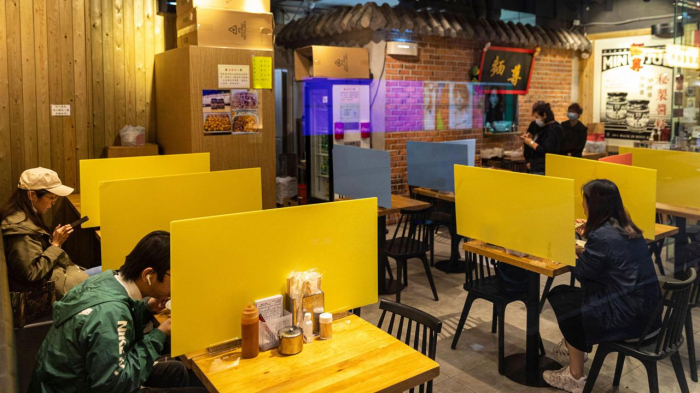
When spaces are too small to ensure appropriate distancing, or are indoors, it becomes more difficult. In Italy, for example, some have criticised those solutions which are based on defensive design principles – which seek to “mistake-proof” a design out of fear that the user may misuse a device. In restaurants, one example is using plastic screens to split restaurant tables, making it all but impossible for customers to get too close to one another. Some felt that the screens were impractical and would take away the joy of a shared meal: the table “has that ‘jail visit’ vibe”, one local commented on Facebook.
The importance of trust
Recent research has identified trust as the backbone of social and economic recovery. In order to go back to “normal life” – and to use public or communal spaces – people must feel physically safe and trust that others are looking after their safety, too.
“Trust is key to rebuild people’s confidence when gathering in public or private spaces,” says Aditi Ratho of the non-profit Observer Research Foundation in India, who was not involved in the research. “When it comes to restaurants, gyms and theatres, people are worried about hygiene standards and protocols, they want to feel safe and secure.”
After the collective trauma of surviving a pandemic, she says, “you have to incorporate people's psychology in your design plans”.
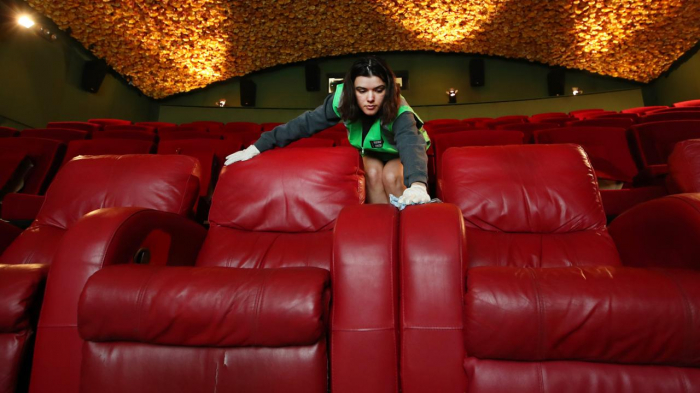
One of the traditional challenges of urban design in India, she explains, is that cities are densely populated, and that poses a set of risks beyond the coronavirus contagion. Well before the pandemic struck, she says, urban designers were already thinking about how to deal with usually crowded spaces like metro stations, or theatres. “I think the concept of theatres is going to completely change because people will increasingly use streaming platforms; they're going to be staying at home more,” she says.
But public transport remains essential in India. In Mumbai, plans are underway to restructure the metro cross area, that space just outside the station where people switch to taxi, bike or auto rickshaw to reach their destination. Here, “people congregate in big numbers and while on the one hand some defensive design is employed, for example limiting seating spaces, designers are also thinking about accessibility for disabled people and how to keep the transit safe for women at all times”, she says – for example by avoiding unnecessary staircases and making sure transit areas are well lit.
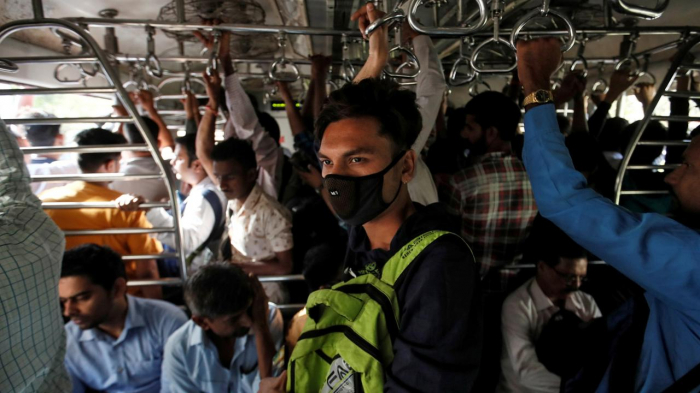
In restaurants, restoring trust among customers means open kitchens to show them that their food is handled with the highest hygiene standards. Other safety measures will likely be digital. Giuliano Vita, co-founder of Italian start-up Dishcovery, is managing a collective of digital entrepreneurs who are helping restaurateurs innovate their services in the post-Covid-19 age.
He anticipates a boom in digital menus, which won’t be used just to order take-away but also when eating at the restaurant. “The owner would print a QR code on the table and the customers can visualise the menu by simply scanning it with their phones,” he says.
In gyms, says Neha Motwani, founder of online gym-finding platform Fitternity, owners might eliminate showers and locker facilities to enable social distancing. They might also stagger gym attendance to allow for housekeeping sessions throughout the day.
During the pandemic, many people took classes online. While online fitness may remain appealing to many, Motwani says, it won’t replace the traditional space where people get together. “We surveyed our users, and we realised that over 95% of them can't wait for their general studio to open up,” Motwani says. “They want the high five with their trainer. They want a sense of community.”
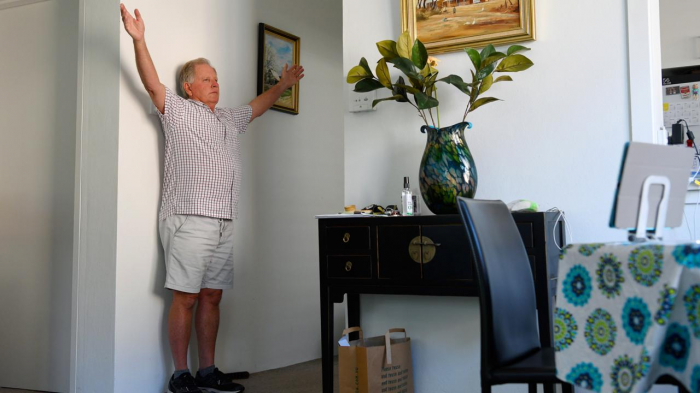
Brick-and-mortar gyms will look different, however, says Ben Hackney-Williams, head of content for Escape Fitness, a UK based company that designs and installs gyms in more than 80 countries. Before the pandemic multiple people would routinely take turns on the same machine. Hackney-Williams envisages that future gyms will instead be divided into sections that are independently equipped with modular tools, equipment that can be replicated across the gym. That way, each person can exercise without sharing any equipment or getting too close.
The design community has also been galvanised in a search of solutions to help restore social life and heal people’s mental health. “New trends in fitness often move from Western countries to Asia,” Hackney-Williams says. For example, cycle studios or high intensity interval training, usually with many people following the same class to loud music, spread from Western countries to Asia. “But the situation has been inverse this time. Since the spread of coronavirus started in China, we’ve seen knowledge and information on how to deal with the crisis and its aftermath coming from that direction.”
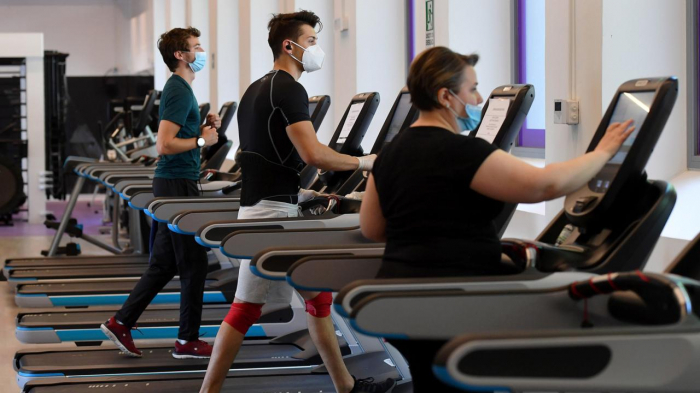
Gym chains with branches in Asia increased their spend on cleanliness in their American facilities to ease members’ concerns even before the virus hit the West. And they were the first to implement closures before the government mandated them.
If one good thing has come out of these strange times, Hackney-Williams says, it is that during the lockdown people started to realise that keeping fit doesn’t necessarily mean hitting the gym for hours every day. “Going for a run in the park or finding a light routine that works for you is enough to stay healthy,” he says. In the post-Covid-19 age, he hopes, people won’t see the gym as an elite place where only fitness fanatics are welcome.
While the pandemic forced us to reorganise our shared spaces, lockdown has given us the time to rethink what we want our social life to look like. And although we may have to wave goodbye to the lively, crowded bars, theatres and gyms that we used to love, at least for some time, we also have the unique opportunity to rediscover what togetherness means in new spaces – and to reimagine those spaces from scratch.
CNN
More about: #COVID-19















































